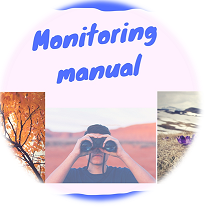All schools in Europe are invited to participate in a meteorological and phenological observations in schools’ surroundings, to report these observations on the portal and to have access to interesting accumulated data. We invite you to become a part of a larger effort to gain a holistic understanding of global environmental issues. Your students may act as scientific eyes and ears in the field. No special equipment is needed, you’ll just report observations once a week, using our user-friendly tool. We also prepared a useful guide on how to conduct observations and report (you will find it below). Teachers may download reports containing gathered information and use them for a wide variety of subjects, including biology, chemistry, physics and mathematics.
We invite you to report observations conducted by your students in schools’ surrounding each Monday. If you are unable to report it on Monday, no worries: you may still do that on Tuesday, but remember to provide information on values accurate for the previous day.
Some meteorological parameters in our monitoring system are reported as actual values: air temperature, cloud cover, precipitation, visibility reduction and wind force. We are also asking you to report on meteorological and hydrological phenomena, which occurred within the previous week: lightning, extreme and other atmospheric phenomena, ice on lakes and rivers and snow cover.
We also engage you in biological field observations, including plants (Birch, Lilac, Bilberry, Rosebay willowherb, Rowan), insects (Bumble bee, Mosquito, Ant, Common brimstone, European peacock butterfly) and birds monitoring (Arctic tern, Common Cuckoo, White wagtail, Crane).
Due to the large variation through the entire European continent some of the parameters and variables can be difficult to observe throughout Europe. However, we tried to propose monitoring of species, which are occurring all the way from the Mediterranean Sea in the south to the Barents Sea in the north, and some of the parameters may be valid for European Arctic (like Svalbard). If particular species are not observed in your surroundings, you may just leave the box empty, but still provide other information.
And remember, there are extra points in EDU-GAME for being a part of our Monitoring system!
Check out our MANUAL (download or VIEW as e-book) describing in details all the rules, technical issues and all parameters to be observed. We hope it will be a useful field guide for teachers and our young future - scientists.
Other language versions: WERSJA POLSKA (Polish version)
- Join Monitoring System by confirming location of your school.
- Fill in your first measurement.
- Engage your students to collect measurements on weekly basis (on Monday).

